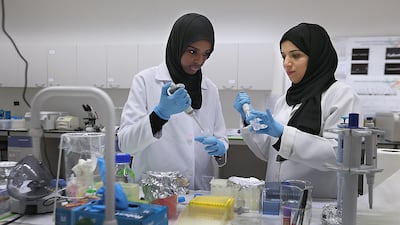The UAE saw improved rankings in this year’s World University Rankings, with Khalifa University of Science and Technology the standout performer, shooting to the 301-350 band.
This is the best ranking ever achieved by a UAE institution on the list, which is compiled annually by Times Higher Education and includes 1,102 universities from 77 countries.
The university has gone up at least 150 positions this year after being ranked in the 501-600 bracket last year and it is the first time it is included since it merged with Masdar Institute of Science and Technology and Petroleum Institute.
The university — which was founded in 2007 following a decree from President Sheikh Khalifa — was also the youngest university to make the 2016 QS list of 100 best universities in the world established under 50 years.
UAE University was placed in the 501-600 bracket, the same as last year.
American University of Sharjah was placed in 601-800, having not been ranked last year and University of Sharjah was in the 801-1000 bracket, having also not been ranked last year.
Sheikh Hamed bin Zayed, Chairman of the Abu Dhabi Crown Prince Court and Chairman of the Board of Trustees for Khalifa University, said the ranking was proof of the quality of education in the country and what it has achieved over a few years.
“It employs all its efforts and capabilities to graduate the next generation of young people that is capable of taking responsibility to build the country and enhance its role in enhance the country’s economic role,” he said.
Among the standout universities in the Middle East and North Africa was the Hebrew University of Jerusalem in first place and King Abdulaziz University in Saudi Arabia in second. Khalifa University was in fifth place.
Dr Tod Laursen, president and professor of mechanical engineering at Khalifa University, said the result is a huge boost considering the university is barely 10 years old.
"It's a sign that we are clearly on the right track. Students take great pride in studying here — it's named after the ruler — and they are now recognised and appreciated on a global scale," said Dr Laursen, speaking to The National at the unveiling in London.
Dr Laursen also credited the government for their support.
"There has been great government support. If you listen to what people are going through in Europe and the US for basic academic needs — that hasn't been a problem for us.”
He said research was improving in the UAE but support for basic science was still missing. However, he expects this will change over the next 10 to 15 years.
"Our focus will always be on Emirati students. So in that sense, we are not worried about competition from international campuses opening up in the UAE, as their main market is expats.
"The international competition for us comes in a different way - it comes from the government's scholarship programmes, that send talented local students to the best places in the world. So we're not competing with the likes of Middlesex - we're competing with Berkeley and the University of Illinois, and Imperial. Because we want to get the creme de la creme of the local students.”
Dr Laursen said the university would like to see itself listed within the top 200 of the world rankings within the next five years.
"I think the aspiration for the country as a whole will be much higher than that. This country is very aspirational."
Last year the university inaugurated its new campus extension which houses 44 laboratories including aerospace and underwater robotics labs, 33 new classrooms, multi-purpose sports halls, as well as retail and food outlets.
The university organises the Mohammed Bin Zayed International Robotics Challenge whereby international teams from 45 academic institutions and robotics companies compete to use Unmanned Aerial and Ground Vehicles to locate, track and land on moving vehicles, locate and reach a panel and physically operate a valve stem on it, and work together in order to search, locate, track, pick up and place a set of still and moving objects.
In May, Khalifa University of Science and Technology won all the awards in the national organisations category of Mohammed Bin Rashid Al Maktoum Global Water Award, which was launched to encourage the worldwide research of sustainable and innovative solutions to address clean water scarcity using solar energy.
The University of UAE and the American University of Sharjah also featured in the world rankings.
Their exact placing is due to be announced at an event in London on Tuesday.
Phil Baty, editorial director of global rankings at Times Higher Education, said: “This has been a good year in the rankings for the UAE on a number of fronts.
“First of all, the consolidation of a number of institutions into the recently merged Khalifa University in the rankings calculations this year has led to the highest ever ranking for the UAE — a place in the 301-350 band. This consolidated institution is a strong new flagship asset for UAE and hopefully will go from strength to strength.”
Mr Baty said it was encouraging to see both UAEU and the American University of Sharjah hold onto their positions from last year, amid intense and increasing global competition, while he welcomed the new arrival of the University of Sharjah to the global rankings.
He pointed out that it is not easy to break into the top 1,000. “Our top 1,000 list represents just 5 per cent of the world’s higher education institutions, so institutions must meet high global standards to be included.”
This is the fourteenth edition of the Times Higher Education’s World University Rankings, which is considered the definitive list of the top 1,000 institutions from 77 countries.
* Additional reporting by Caline Malek

